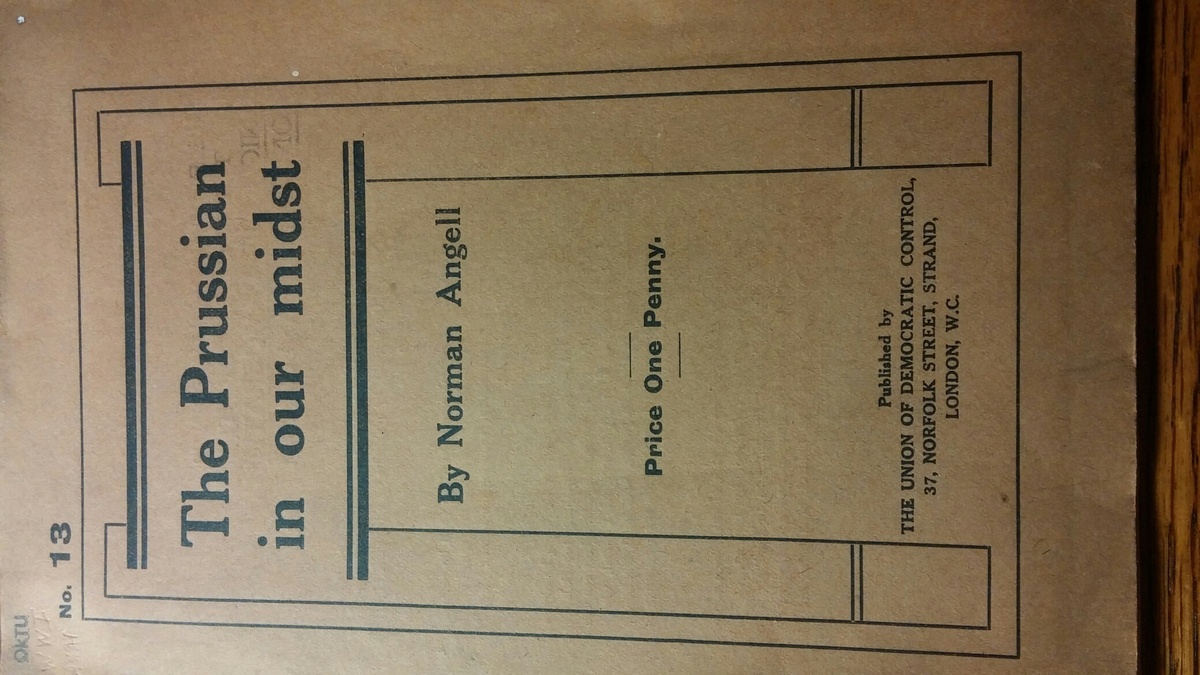Dublin Core
Title
The Prussian in our Midst
Subject
Document
Description
Norman Angell's World War I pamphlet "The Prussian in our Midst" is approximately 30 pages consisting of four sections: "The War to End War;" "But Is Britain to Have the Will at the End of the War;" "The Creed of the Enemy;" and "How Our Will to End War Is Being Undermined." It was published by The Union of Democratic Control in London in 1915. The pamphlet is volume 13 of 14. It originally cost one penny. It remains in good condition with only the front and back cover detached from the body of the document.
The purpose of this pamphlet is to argue for the importance of Britain as a nation, its political leaders, its military, and its citizens to remember that militarism alone will not move Britain into a more peaceful world. Angell argues that while militarism may be necessary at the beginning and during the war, Britain must remember to lead the charge to establish a policy of democratic and liberal internationalism among the leading Allied powers in order to create a more peaceful world based on diplomacy, and not force. He strongly disagrees with defenders of military philosophy who contend that war is an inevitable problem and that creating the greatest military force is the only resolution.
Angell addresses every citizen of Britain to be very wary of the wartime instinct of "might makes right." His rhetoric is cautionary, well researched, and biting in the way that he equally acknowledges the reality of war and the altogether different and diplomatic reality of both ending war and preventing future war.
Angell's liberal internationalism helped to lay the groundwork for the League of Nations and United Nations. His cautionary tale of reacting to jingoist militarism by fighting fire with fire is still ever-prevalent today. His strong belief in the democratic strength in numbers and international diplomacy over bombshells is a central belief that still separates free and prosperous nations from tyrannous regimes.
The purpose of this pamphlet is to argue for the importance of Britain as a nation, its political leaders, its military, and its citizens to remember that militarism alone will not move Britain into a more peaceful world. Angell argues that while militarism may be necessary at the beginning and during the war, Britain must remember to lead the charge to establish a policy of democratic and liberal internationalism among the leading Allied powers in order to create a more peaceful world based on diplomacy, and not force. He strongly disagrees with defenders of military philosophy who contend that war is an inevitable problem and that creating the greatest military force is the only resolution.
Angell addresses every citizen of Britain to be very wary of the wartime instinct of "might makes right." His rhetoric is cautionary, well researched, and biting in the way that he equally acknowledges the reality of war and the altogether different and diplomatic reality of both ending war and preventing future war.
Angell's liberal internationalism helped to lay the groundwork for the League of Nations and United Nations. His cautionary tale of reacting to jingoist militarism by fighting fire with fire is still ever-prevalent today. His strong belief in the democratic strength in numbers and international diplomacy over bombshells is a central belief that still separates free and prosperous nations from tyrannous regimes.
Creator
Norman Angell
Source
McFarlin Library, Department of Special Collections and University Archives, University of Tulsa. 2933 E. 6th St. Tulsa, Oklahoma 74104-3123
Publisher
The Union of Democratic Control, 37, Norfolk Street, Strand, London, W.C.
Date
1915
Format
Paper, 9" x 5", approx. 30 pages
Language
English
Type
Pamphlet
Identifier
Collection 1000-099-1; Item # A47P
Coverage
Great Britain
